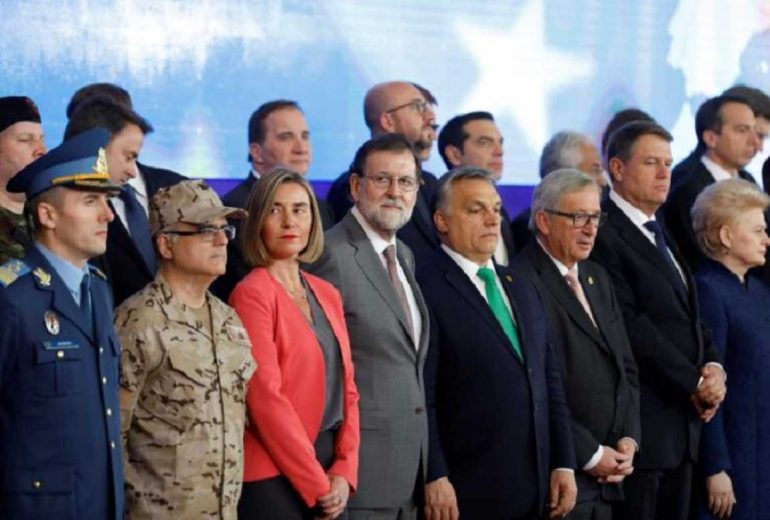"Security challenges in the Eastern Mediterranean make even more urgent the need for a fair and sustainable settlement of the Cyprus issue on the basis of UN resolutions and without Turkish guarantees," said Greek Prime Minister Alexis Tsipras during a speech at the European Summit. Council, yesterday in Brussels, according to a Greek government source who informed the press.
Specifically, during the briefing of Europeans on Erdogan's visit to Athens, the Greek Prime Minister stressed that developments in immigration were one of the main reasons for Erdogan's invitation to Athens, despite the disagreements at national and ideological level.
He stressed that in an area immersed in destabilization (Syria, Iraq, Afghanistan, Palestine, Lebanon, Jerusalem, Turkish coup and restriction on human rights, Kurdish), Greek-Turkish relations can not be considered a bilateral issue. It is a matter of supporting the South East European borders, which are becoming increasingly important. European security and the management of refugee and migration flows are based on smooth Greek-Turkish relations.
At the same time, the security challenges in the Eastern Mediterranean make even more urgent the need for a fair and sustainable settlement of the Cyprus issue on the basis of UN decisions and without Turkish guarantees.
"So the need for peace, respect for international law and co-operation in the Aegean and the Mediterranean is a European issue that is more important today than ever," he said.
"The same source spoke of three important steps since Erdogan's visit." First, it was agreed to resume talks on the continental shelf and Confidence-Building Measures under the high supervision of Prime Minister and President Erdogan. Secondly, the two sides agreed on measures for the more effective implementation of the EU-Turkey Agreement and for Turkey to start re-implementing the bilateral Readmission Agreement.
Third, "President Erdogan has publicly stressed that he seeks a just and lasting solution to the Cyprus problem and that talks must continue," the Greek government source said.
The Prime Minister welcomed the fact that the EU, Germany and Bulgaria responded to Turkey regarding Erdogan's statements on the revision of the Lausanne Treaty. The Prime Minister asked for support for Turkey in the coming months: to stop the violation of international law in the Aegean with continuous violations and entanglements, to intensify the positive cooperation so far under the EU-Turkey Agreement, to continue the talks, on its terms GOGE, for the Cyprus issue.
With regard to refugees, the Prime Minister described Donald Tusk's note as unacceptable, stressing that it not only complicates the management of refugee flows but also jeopardizes the future of the EU as it undermines the concept of solidarity. He stressed that the important thing for Greece is not some forces to accommodate 200 or even 1000 people but that they insist on undermining the principles on which the EU is based.
He also stressed that Greece respected EU rules and the sensitivities of other member states and maintained European solidarity, despite disagreeing with a number of policies in the economy (austerity) and foreign policy (sanctions against third countries). All Member States must do the same today to tackle this European issue.
On the issue of funding, he agreed that financial instruments (possibly new ones) should be made more flexible in order to respond to the current reality and be absorbed by third countries. The point is not just to have more funds, "but to integrate our immigration goals into EU foreign policy".
Explain in detail how
A) The financing of third countries in the above context should depend on their effectiveness in dealing with traffickers, reducing flows and accepting returns.
B) Significant initiatives should be taken to address the root causes of refugee and migration flows (poverty, war) and to integrate foreign and defense policy.
C) A European return mechanism should be set up and
D) a European resettlement mechanism with application centers in third countries of transit and origin.
Finally, Alexis Tsipras took the initiative and put the agenda for social Europe into practice.
He stressed that the European pillar of social rights is important and must be implemented.
He argued that the social dimension is a necessary condition for a united Europe. The Social Pillar will balance the fiscal pact. The European Semester (economic and fiscal policy coordination process) should include binding social objectives and called for a conclusion to be made in the conclusions.
The proposal was reportedly backed by the Commission, France, Italy, Sweden and Portugal, among others, and left open the possibility that Germany would also support it, the issue will be returned to the European Council next March. In this context, the Commission undertook to return with proposals to monitor the implementation of the European Pillar of Social Rights.
Source: Athanasios Athanassiou, RIK Brussels
Source: RIK News
